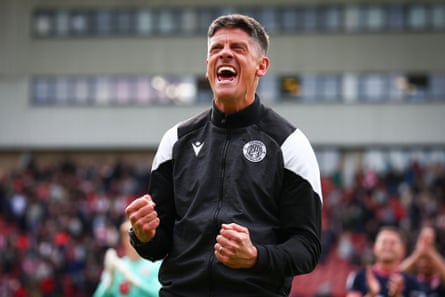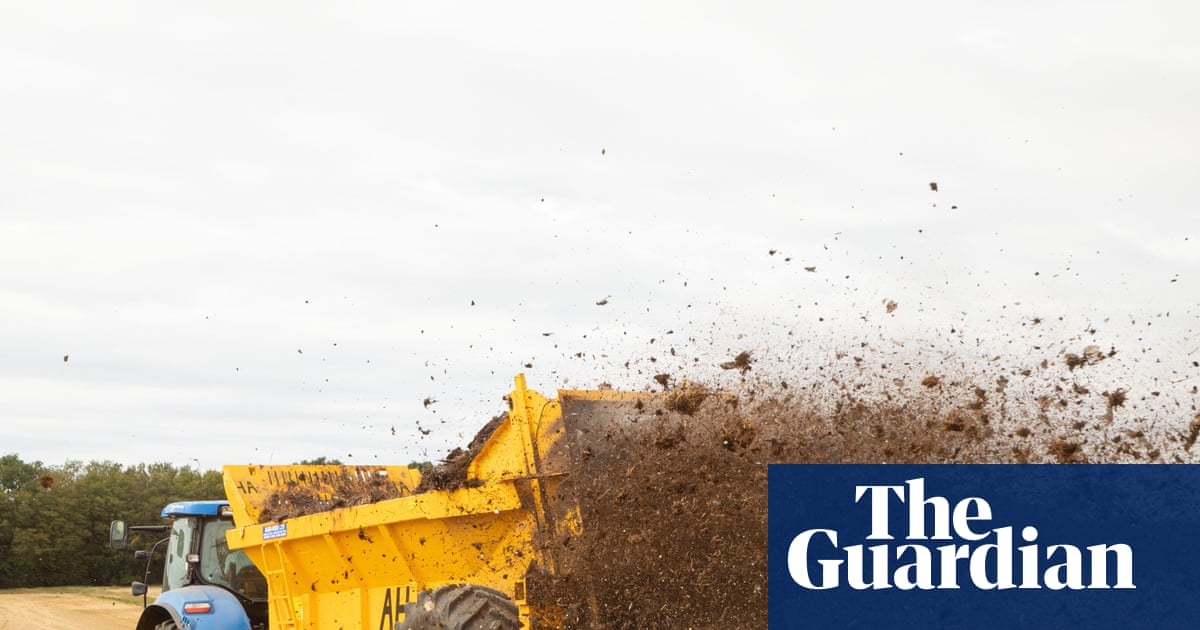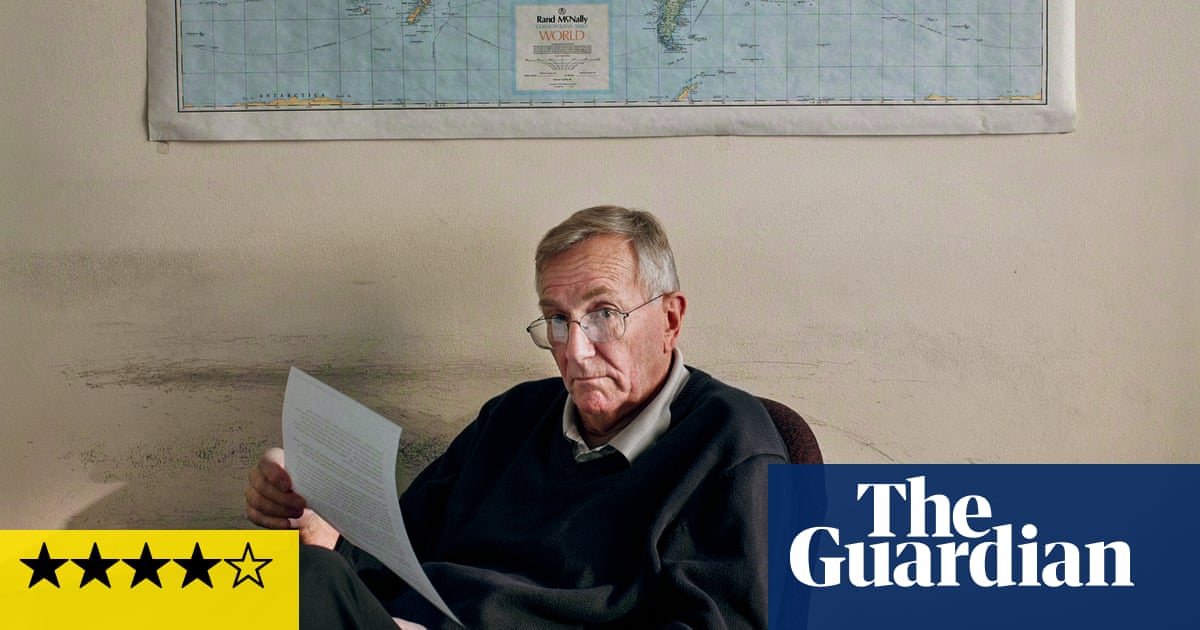These are heady days at Stevenage. They are top of League One under Alex Revell and a mile or so up the road an Airbus hub is building robots to explore Mars. A couple of months ago the club’s longstanding chair, Phil Wallace, highlighted how Stevenage were one of the best points-per-pound performers last season – when they finished in mid-table – and after a near-flawless start this time, they have the best points-per-game record across England’s top four divisions.
It is fair to say supporters are getting plenty of bang for their buck. A crowd of 7,228 packed into Stevenage’s modest ground for their latest league victory, over Luton, their highest attendance since welcoming Newcastle in the FA Cup fourth round in 1998, when a temporary stand boosted the capacity. Revell exudes pride as he discusses the strides the team have taken since he stepped up to manage the club – where he finished his playing career – for a second time 18 months ago. “We’ve got something everyone else is searching for – and we’ve got to protect that,” the 42-year-old says.
The million-dollar question is: how have a team with a bottom-half budget stormed to the summit? Revell takes inspiration from the way Wycombe and Leyton Orient outmuscled bigger fish last season and summer recruitment, overseen by the sporting director, Leon Hunter, was pivotal. Jordan Houghton, a midfielder who began his career at Chelsea, joined after rejecting a new deal at Plymouth, and the goalkeeper Filip Marschall and winger Chem Campbell signed permanently from Aston Villa and Wolves respectively. Dan Kemp and Harvey White also have top-flight pedigree. The top goalscorer, Jamie Reid, is a Northern Ireland international. Things have evolved since Revell retired six years ago. “Before it was: ‘Who can we get?’ Now it’s: ‘Who do we want? Who can make us better?’”
Highest points per game in 2025-26
ShowAcross England’s top four tiers
Stevenage: 2.5 (10 games played)
Arsenal: 2.29 (seven)
Bradford City: 2.18 (11)
Swindon Town: 2.18 (11)
Walsall: 2.17 (12)
Liverpool: 2.14 (seven)
Coventry City: 2.11 (nine)
Cardiff City: 2.09 (11)
Revell returned to Stevenage in January 2022, initially as an academy coach before being named first-team coach by the newly appointed manager Steve Evans six weeks later. The following year they toasted promotion to the third tier, as well as a memorable Cup win at Villa Park. As a No 9 at Rotherham, Revell famously sent Evans haring down the Wembley touchline after scoring a peach in a playoff victory that propelled them into the Championship. Upon joining Evans’s staff, he was unafraid to get his hands dirty, putting the sports science degree he completed as a player – his dissertation focused on the psychosocial factors that affect players during injury – into practice.
“Sports science is the Grim Reaper, right?” Revell says. “Warm-ups, running, no one likes them. I dived into it. I did video analysis because we didn’t have any analysts when we got promoted out of League Two.” Is there a job he hasn’t done? “I haven’t been groundsman yet,” he says, smiling, looking towards those at work on the mowers below. Even now, Stevenage have only seven first-team staff. “They don’t really have a job title … you might have to bring waters in from the gym, help us put cones out. That’s what we are, what we enjoy. We’re a really tight-knit group who are pushing for success.”

Revell shared a classroom with Wayne Rooney, Jonathan Woodgate, Ashley Cole and Tanya Oxtoby on his Uefa pro licence, during which he visited Google and British Cycling. Revell, whose wife, Julia, is a neonatologist, did a presentation on pressure after studying emergency services, the Red Arrows and bomb disposal experts. “I played against Ashley [for Southend against Chelsea in 2009] and he gave me the worst 90 minutes ever because I was just constantly chasing him, but suddenly me and him were working together on a scenario, looking at each other going: ‘What should we do?’”
He acknowledges the power of momentum, citing how Bradford and AFC Wimbledon, second and fifth in the division, have adapted after promotion. He also values his gut. After a 5-0 defeat at Newport in 2021 that left Stevenage 20th in the fourth tier, he confided in Wallace that the team required an experienced leader. “It was the best thing I ever did. If I hadn’t had that time, I probably wouldn’t be here now. I remember sitting with Charlie, my eldest son, in his bedroom before I left and he said: ‘It’s the first time you’ve read to me in a year and a half.’ It wasn’t. But it was the first time I was present, not with my phone next to me looking at a game or replying to messages. It was a poignant moment.”

Revell took a similar decision as a youngster, dropping out of the professional game at Cambridge United, whom he joined age seven. “John Beck signed me; he saw me running the channel, I hooked it on and he went: ‘Right, I’m going to give you a two-year contract,’” he says, laughter now filling the room. But he fell out of love with the game, so joined Braintree Town and set up a business as a personal trainer. “I follow my gut a lot. When I don’t, it causes uncertainty in me.” He enjoyed playing part-time in the Isthmian League. “Myself, Jermaine Beckford and DJ Campbell were all scoring goals in the same division. Leeds signed Jermaine from Wealdstone, DJ went to Brentford from Hayes & Yeading, and I was kind of waiting … then Brighton came in and paid £8,000 for me.”
Wallace, who saved Stevenage from liquidation in 1999, is one of a handful of owners whose stewardship predates the millennium. He has invested in four facilities in close proximity, including an impressive training base and a sports hub for community use. The chair, who made his name in the food business and is the chief executive of Lamex Foods, has overseen the club’s rise from non-league to this point. They qualified for the League One playoffs in 2012 but two seasons later finished bottom and spent the subsequent nine seasons in League Two. In 2020, during the pandemic, they dodged relegation to non-league after Macclesfield were handed a points deduction.
This campaign Stevenage, Liverpool and Bradford are the only teams in the top four tiers with a 100% home league record. On Saturday they travel to Lincoln, another team punching above their weight, seeking to maintain the feelgood factor. Not so long ago the mere thought of reaching the second tier for the first time was probably akin to finding life on Mars. Revell recognises and relishes Stevenage’s position as underdogs but is acutely aware how their fast start – Lewis Hamilton is surely the Hertfordshire town’s most famous son – may be perceived externally.
“‘It’s 10 games: is it just a purple patch?’” says Revell, whose side also have at least one game in hand on almost all their rivals. “That is what people will be saying. Being where we are, we’ve always got something to prove. It is a great place to be because it keeps us on our toes: ‘Let’s prove people wrong.’ It is a really exciting time for us as a club.”

.png) 1 month ago
55
1 month ago
55

















































